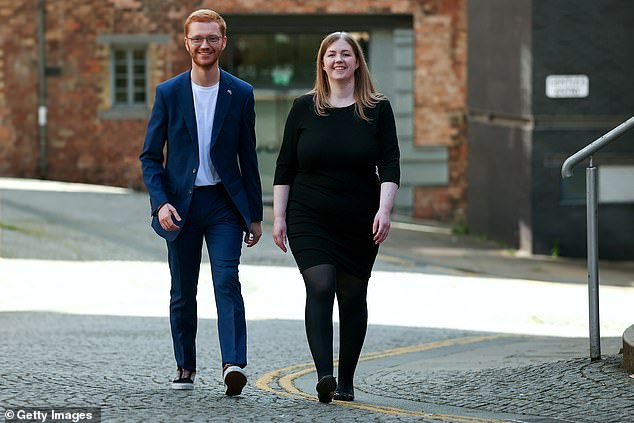Ross Greer and Gillian Mackay, the new co-leaders of the Scottish Green Party, fill me with existential dread.
Not because they’re boiler-banning Bolsheviks – though they are – but because they are the first leaders of a Scottish political party to have been born in the 1990s.
How is that even possible? Shouldn’t they still be watching Power Rangers or playing with Tamagotchis?
They are also the first party leaders to be younger than me, and so tradition mandates that I now shake my fist and inveigh against these damned whippersnappers.
Though nothing I say could condemn them as comprehensively as the internal election that has ushered them in to replace Patrick Harvie and Lorna Slater.
In the end, just 13 per cent of Scottish Green members could be bothered to take part. I’ve seen better turnout at a parish bingo on a wet Wednesday night.
As someone who would like to see Green participation in all elections reduced to zero per cent, this was quite encouraging. Arrange for polling day 2026 to coincide with a non-binary farmers’ market and there won’t be a Green MSP left in Holyrood.
There are all sorts of theories posited as to why turnout was so low, from uninspiring candidates to party bureaucracy. Mine is this: the Greens have more dormant members because they aren’t a political party in the same sense as the SNP or Labour.

Ross Greer and Gillian Mackay, the new co-leaders of the Scottish Green Party , fill me with existential dread, writes Stephen Daisley
People join those parties to contribute to debates and vote on policies, whereas the Greens are really just a radical chic accessory sported by the guilty affluent to signal their ethical superiority and pacify their social conscience.
It’s why the Greens talk about taxing an ill-defined ‘super-rich’ rather than having an honest conversation about the structure of income tax and the revenue it generates.
Many Green members and voters won’t be super-rich, merely well-off, and so by concentrating the fiscal burden on Scotland’s supposed megabucks households the Greens make themselves a safe vote for those who have a strong belief in social justice and an even stronger belief that someone else should pay for it.
In reality, there aren’t all that many super-rich households in Scotland.
And since we aren’t blessed with a large cohort of extremely wealthy citizens, the only way we could raise sufficient revenue to undertake the kind of spending commitments the Greens want to see, and make those commitments sustainable, is by increasing income tax across the board.
They know this, of course. Greer even alluded to it after his victory. Listing the various social protections offered in Scotland but not England (the Scottish Child Payment, free school meals, no school-meals debt), he said: ‘We need to be honest about the fact that all needs paid for.’
We do indeed. Spending needs to be funded and that means either tax rises or spending cuts elsewhere. Dare I say, Greer’s statement is just another way of making a point Theresa May was fond of making: there is no magic money tree.
Further evidence that Greer understands this comes in his support for a council tax revaluation. He says: ‘The fact we have a council tax system based on valuations from before I was born is absurd.’ While I really don’t need another reminder of his youthfulness, the point he makes is not unreasonable.

For all that we are told to beware populist demagogues like Nigel Farage who try to mislead us with easy answers to complex problems, Greer and Mackay are progressive variations of Faragean politics
It is faintly ludicrous that we tax households based on the estimated value of their property 34 years ago. I’m sympathetic to former Tory minister Lord Willetts’ proposal to scrap council tax in favour of a proportional property tax that would leave three-quarters of households paying less per year.
But if council tax must remain, revaluation only gets us so far.
Greer says: ‘The Scottish Greens are brave enough to say that actually the wealthiest people in this country, in the biggest houses, are going to need to pay more to protect public services.’
It doesn’t take bravery to say the very rich need to be taxed even more. That’s the easiest, safest thing in the world to say. What takes bravery is starting a conversation about how much the state (local and central) does, whether it works as social policy or is fiscally prudent, and what proportion of these services could be provided by the private sector instead.
This requires bravery because it involves being candid with the public about its expectations from government and its willingness to stump up to fund them. Fiscal honesty is the only way forward: if you want more services, you personally will have to pay more in taxes; if you want to pay less in taxes, you personally will have to accept less in services.
Neither Greer nor Mackay has what it takes to lead such a debate. For all that we are told to beware populist demagogues like Nigel Farage who try to mislead us with easy answers to complex problems, Greer and Mackay are progressive variations of Faragean politics. They play to public anger and resentment towards ‘elites’ and tell the punters their troubles are the doing of a conspicuous minority who get favourable treatment from the state.
‘Stop the boats.’ ‘Tax the super-rich.’ Or, as Greer said over the weekend: ‘The Scottish Greens are coming for that wealth.’
Snappy slogans and memorable pledges but misleading in their implication that doing that one thing will magic away all the difficulties the country faces, whether that’s illegal immigration or poverty.
The new Green leadership will struggle on fiscal matters because these largely do not interest them. Greer and Mackay are products of the Harvie era and its relentless focus on statement-making. Greer’s chief interests appear to be gender and Gaza, neither of which features high on the priority list of most Scots.
Mackay’s time at Holyrood has dwelt on her crusade to ban disposable vapes and her legislation to get little old ladies huckled for praying across the street from abortion clinics. (Grannies with Rosary beads, the real criminal menace plaguing Scotland’s streets.) Mackay, who is from Grangemouth, said in 2016: ‘I’d much rather have a wind farm than an oil refinery on my doorstep.’ Then, when Grangemouth’s closure was announced in 2024, she pronounced herself ‘devastated’ and rebuked governments for not having ‘done enough to protect the workers’.
Yet if the latest polls are reliable, the Greens might hold the balance of power in the next parliament. It’s not impossible that they could end up back in government. I needn’t remind anyone how things went when their predecessors were handed ministerial power.
Unfortunately, this is the calibre of politician Holyrood produces and it is Holyrood’s electoral system that hands fringe parties so much power. The only hope is that the Greens’ switched-off supporters switch on in enough time to realise that a vote for Ross Greer and Gillian Mackay next May is a vote for a duo who will worsen rather than improve Scotland’s political and economic dysfunction.
They have no interest in economic growth but plenty of plans on how to spend it. Plenty of rhetoric about the super-rich but no interest in growing their number in Scotland. The Greens don’t want to arrest Scotland’s decline, they want to accelerate it. With Greer and Mackay in the driving seat, they might just get their wish.












